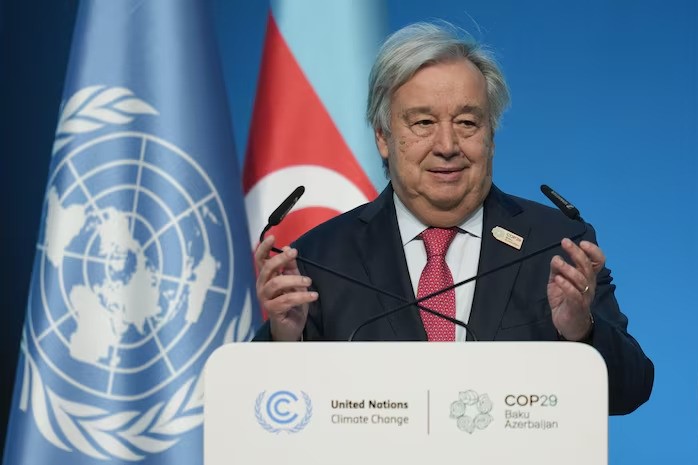Guterres Calls on World Leaders to Fund Climate Action as Time Runs Out
UN chief urges urgent climate funding at COP29, warning leaders that time is running out to prevent catastrophic global warming impacts.
Secretary-General António Guterres urged global leaders gathered at the COP29 summit in Baku on Tuesday to “pay up” to avert catastrophic climate-driven humanitarian crises, warning that time is running short to prevent a damaging surge in global temperatures.
With nearly 200 nations convened at the annual UN climate summit, this year’s focus is on mobilizing hundreds of billions of dollars to support a global shift to cleaner energy sources and mitigate the harmful climate impacts of carbon emissions.
However, on this day, intended to unite world leaders and build political momentum for the intensive negotiations, many key figures were notably absent from Guterres’s address.
Following the US election victory of Donald Trump, a climate change skeptic, President Joe Biden opted not to attend. Chinese President Xi Jinping sent a deputy, and European Commission President Ursula von der Leyen remained in Brussels due to political events.
“On climate finance, the world must pay up, or humanity will pay the price,” Guterres declared in his speech. “The sound you hear is the ticking clock. We are in the final countdown to limit global temperature rise to 1.5 degrees Celsius, and time is not on our side.”
This year is on track to be the warmest in recorded history.
Scientific evidence suggests that global warming and its consequences are unfolding more swiftly than anticipated. Experts caution that the world may already have reached 1.5 degrees Celsius above the pre-industrial average — a threshold that could trigger irreversible and extreme climate changes.
The opening of COP29 coincided with unusual wildfires on the US East Coast, which have spurred air quality warnings in New York. Meanwhile, Spain is grappling with the aftermath of unprecedented flooding, prompting the government to announce billions of euros for reconstruction efforts.
Economy Killer
The summit’s opening on Monday featured a crucial technical agreement, laying the groundwork for a U.N.-backed global carbon market designed to channel billions toward projects to cut greenhouse gas emissions.
The achievement, however, was overshadowed by a dispute over the summit’s agenda priorities, with European and small island nations clashing with Arab states over the extent to which fossil fuels should feature in the discussions. Opening procedures were delayed by more than five hours, concluding with a compromise reluctantly accepted by the EU and aligned nations.
On Tuesday, COP29 officials shifted focus back to the summit’s principal aim: securing a deal for up to $1 trillion annually in climate finance for developing countries.
“Enabling every country to take strong climate action is 100% in all countries’ interests, even the largest and wealthiest. Why? Because the climate crisis is fast becoming an economy killer,” said Simon Stiell, head of the UNFCCC, which oversees the summit.
“Unless all countries can slash emissions deeply, every country and every household will be hammered even harder than they currently are. We’ll be living in a permanent inflationary nightmare.”
(With inputs from Reuters)

